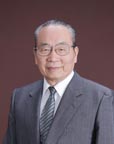Hitoshi Watanabe: Difference between revisions
(Created page with "== Biography == Hitoshi Watanabe’s vision and determination established circuit design methods that led to the era of computer-aided design, an indispensable tool for develop...") |
No edit summary |
||
| (7 intermediate revisions by 3 users not shown) | |||
| Line 1: | Line 1: | ||
== | {{Biography | ||
|Image=Watanabe.jpg | |||
|Associated organizations=Soka University | |||
|Fields of study=Computer aided design | |||
}} | |||
Hitoshi Watanabe’s vision and determination established circuit design methods that led to the era of computer-aided design, an indispensable tool for developing complex electronic circuits. Faced with the task of designing electrical wave filters for Japan’s telecommunications infrastructure after World War II, Dr. Watanabe found that existing filter design methods were not feasible for creating the wide range of filters needed for a modern system. He developed a new mathematical theory that allowed any filter design to be uniformly captured, but it required an enormous amount of numerical calculations. During the 1950s these were performed by motor-driven calculators, so he set out to design a computer to automate the task, and was devoted to build it. This computer was able to execute double-precision floating-point operations via built-in dual arithmetic units, which was highly innovative at the time. | |||
An [[IEEE Fellow Grade History|IEEE Life Fellow]], Dr. Watanabe is currently a Professor Emeritus in the Department of Information Systems Science at Soka University, Tokyo, Japan. | |||
[[Category:Circuitry]] | |||
[[Category:Computer applications]] | |||
{{DEFAULTSORT:Watanabe}} | |||
Latest revision as of 18:09, 28 January 2016
- Associated organizations
- Soka University
- Fields of study
- Computer aided design
Biography
Hitoshi Watanabe’s vision and determination established circuit design methods that led to the era of computer-aided design, an indispensable tool for developing complex electronic circuits. Faced with the task of designing electrical wave filters for Japan’s telecommunications infrastructure after World War II, Dr. Watanabe found that existing filter design methods were not feasible for creating the wide range of filters needed for a modern system. He developed a new mathematical theory that allowed any filter design to be uniformly captured, but it required an enormous amount of numerical calculations. During the 1950s these were performed by motor-driven calculators, so he set out to design a computer to automate the task, and was devoted to build it. This computer was able to execute double-precision floating-point operations via built-in dual arithmetic units, which was highly innovative at the time.
An IEEE Life Fellow, Dr. Watanabe is currently a Professor Emeritus in the Department of Information Systems Science at Soka University, Tokyo, Japan.
